


Streamlining the approval processes of ethics committees is more crucial than ever in the fast-paced world of clinical research. The increasing complexity of studies and the demand for faster timelines necessitate the adoption of ALIMS-approved templates, which can significantly enhance operational efficiency and communication between researchers and ethics committees. But how can these templates not only simplify the submission process but also ensure adherence to ethical standards while fostering participant trust? This article explores ten essential templates that promise to revolutionize the way ethics committees operate, paving the way for more effective and transparent clinical trials.
The bioaccess® Ethics Committee Template is expertly crafted to expedite the review and approval of clinical study protocols. It includes essential sections for documentation, such as study objectives, methodologies, and ethical considerations, ensuring that all relevant information is presented clearly and concisely. This organized approach significantly reduces the average duration for ethics committee approvals, which, as of 2025, stands at approximately 48 days, with some studies experiencing even longer delays. By utilizing this template, medical study teams can initiate studies more swiftly, enhancing overall effectiveness.
Streamlined ethics committee processes are increasingly recognized as vital in the clinical study landscape. For instance, mutual acknowledgment of ethics approvals across various locations has been shown to reduce the overall time to site activation, making it a crucial factor in accelerating study timelines. Clinical research directors emphasize the significance of alims-approved templates for ethics committees, noting that they not only simplify the submission process but also enhance communication between researchers and ethics committees. By adopting these optimized procedures, organizations can significantly enhance their operational efficiency and responsiveness in the fast-paced world of medical studies.
At bioaccess®, we leverage over 20 years of expertise in managing research studies, including Early-Feasibility Studies (EFS), First-In-Human Studies (FIH), Pilot Studies, Pivotal Studies, and Post-Market Follow-Up Studies (PMCF). Our comprehensive study management services ensure that your tests are not only compliant but also positioned for success.
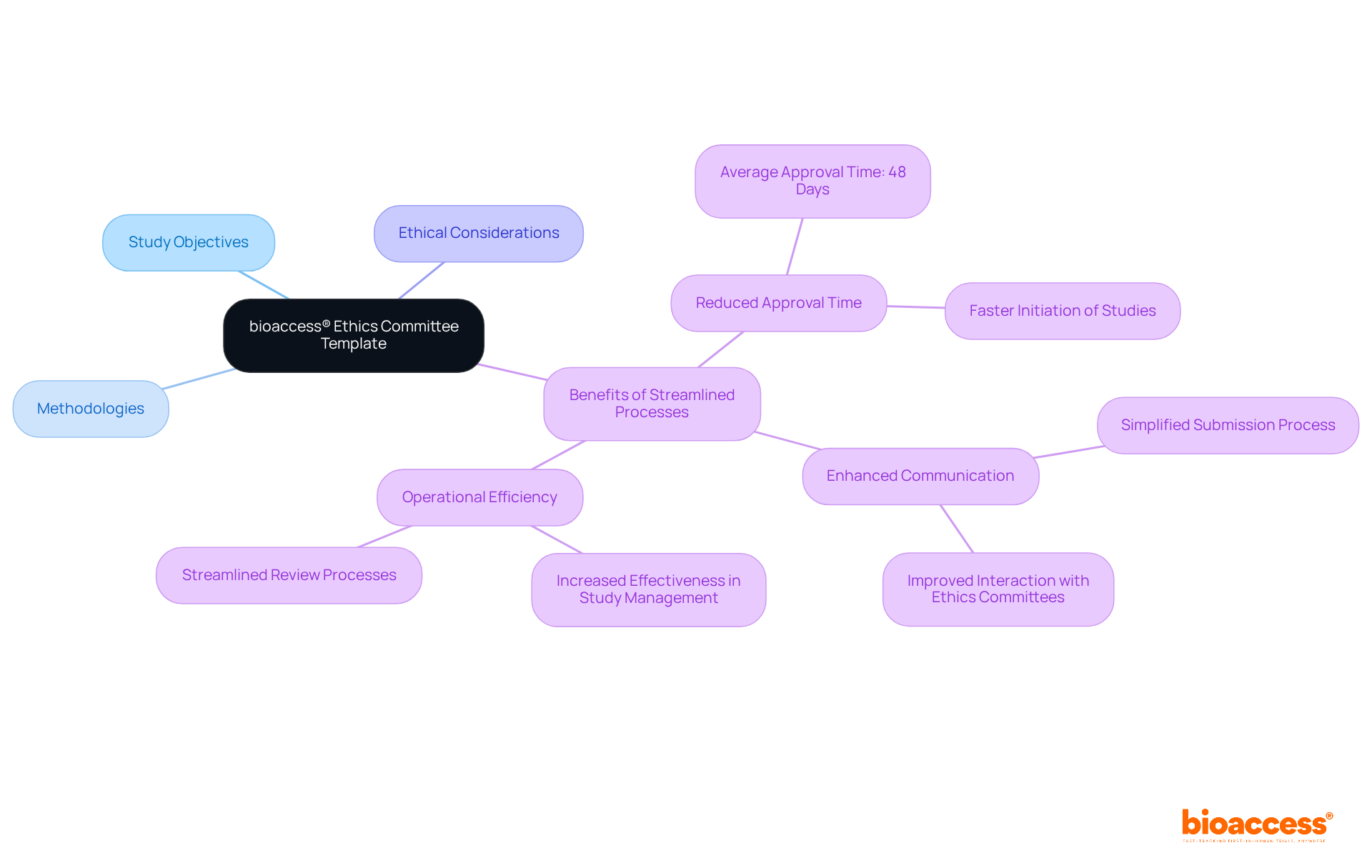
The Informed Consent Template serves as a crucial instrument in clinical trials, outlining the essential information necessary for effective participant communication. It clearly articulates the project's purpose, potential risks, and benefits in layman's terms, facilitating informed decision-making. This approach is vital, especially considering that studies reveal comprehension of informed consent components is a significant challenge. Understanding rates for complex concepts, such as randomization and risks, often fall below 50%, with specific rates reported at 39.4% for randomization and a mere 4.8% for placebo concepts.
To bolster participant understanding, the template includes sections dedicated to documenting the consent process. This practice not only aligns with best practices but also meets regulatory requirements. Adhering to ethical standards is paramount; bioethicists stress that true informed consent relies on participants' ability to grasp the implications of their involvement. As Lesley Jean Burgess noted, 'With the exception of concepts voluntariness and right to withdraw, participants’ understanding of the informed consent document was poor.'
Current trends in informed consent processes underscore the growing use of multimedia tools and cocreation strategies aimed at enhancing comprehension. For example, interactive applications and educational aids have proven effective in bridging comprehension gaps, particularly among diverse populations. Research indicates that these tools can significantly improve understanding, with satisfaction rates exceeding 90% among participants who engaged with these materials. As we approach 2025, prioritizing participant comprehension and adherence in informed consent procedures is more critical than ever, ensuring that research studies uphold ethical standards while fostering trust and transparency.
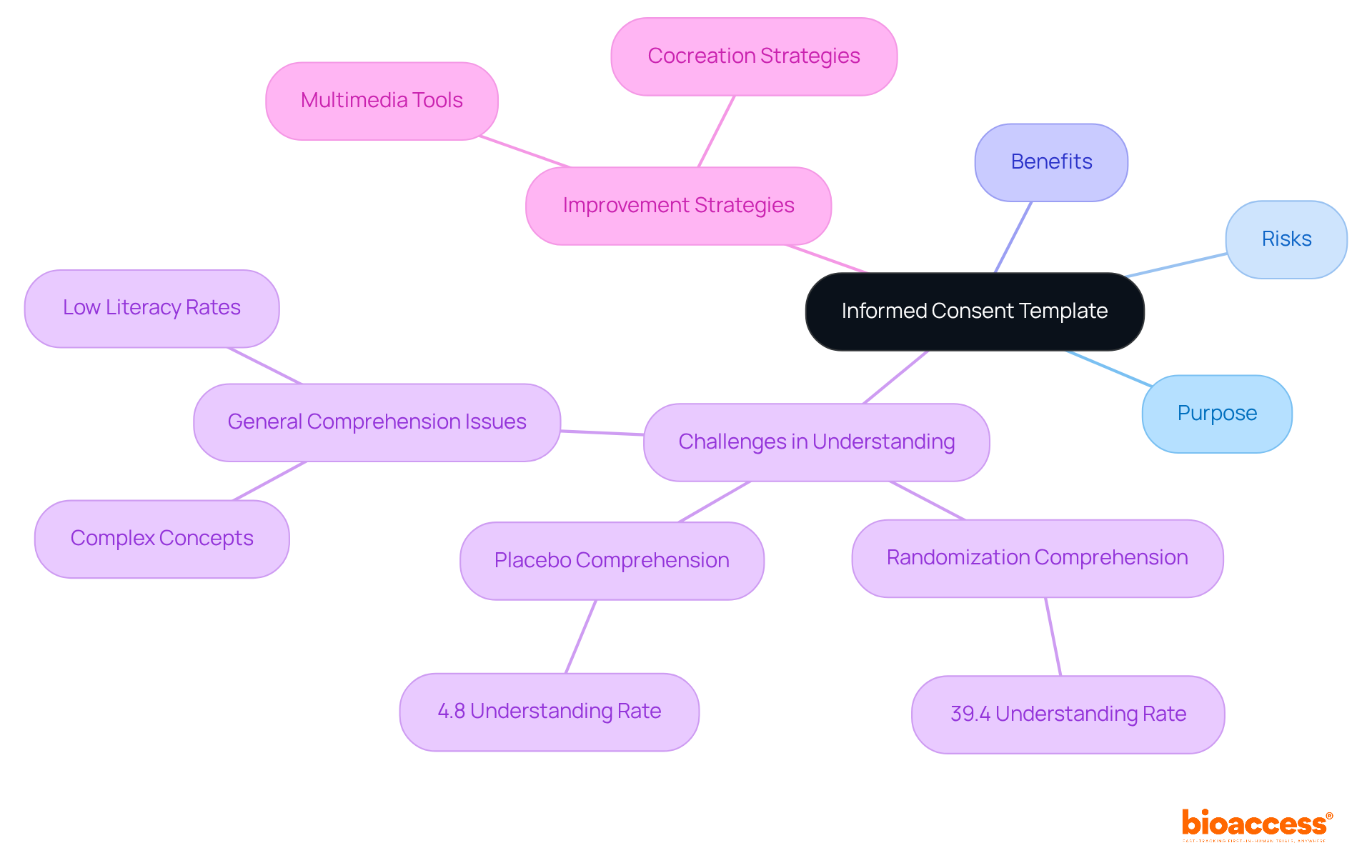
The Study Protocol Template is essential for clearly defining research objectives, design, and methodologies in clinical trials. It encompasses critical elements such as:
This structured approach not only guarantees thorough planning and documentation but also bolsters adherence to ethical standards, facilitating a smoother execution of the study.
Industry specialists emphasize that a well-defined protocol is crucial for maintaining the integrity of research and ensuring participant safety. For instance, structured protocols have been shown to significantly reduce the likelihood of protocol deviations, which can threaten study outcomes. By following current best practices in protocol development, researchers can effectively navigate the complexities of clinical trials, ultimately leading to more reliable and reproducible results.
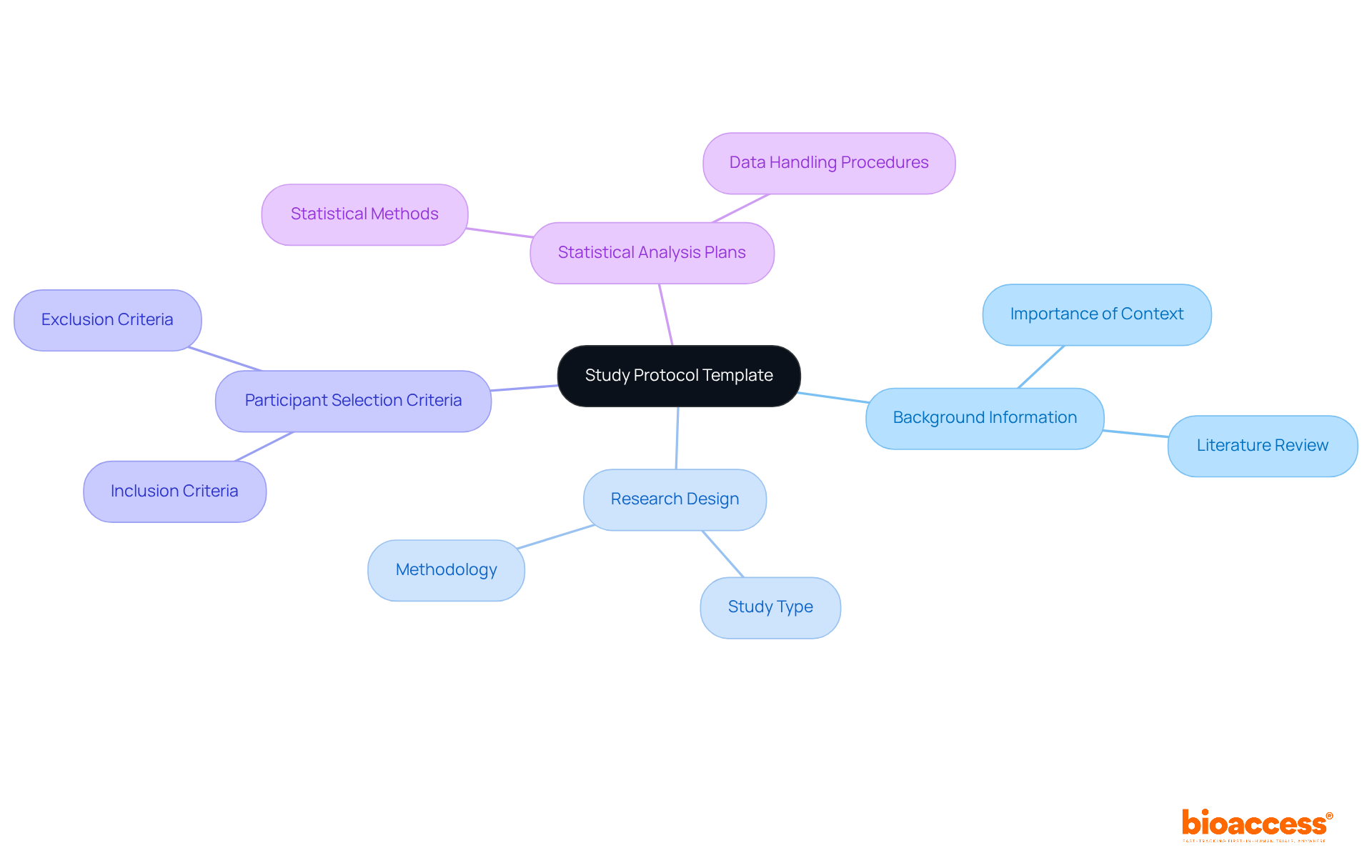
The Risk Assessment Template plays a crucial role in clinical research by helping researchers identify potential risks, including physical, psychological, and social hazards. This template provides a structured framework for evaluating both the likelihood and severity of each risk, along with effective strategies for mitigation. Such a proactive approach is not just beneficial; it is essential for ensuring ethical compliance and safeguarding participant safety. By utilizing this template, researchers can navigate the complexities of risk management with confidence, ultimately enhancing the integrity of their studies.
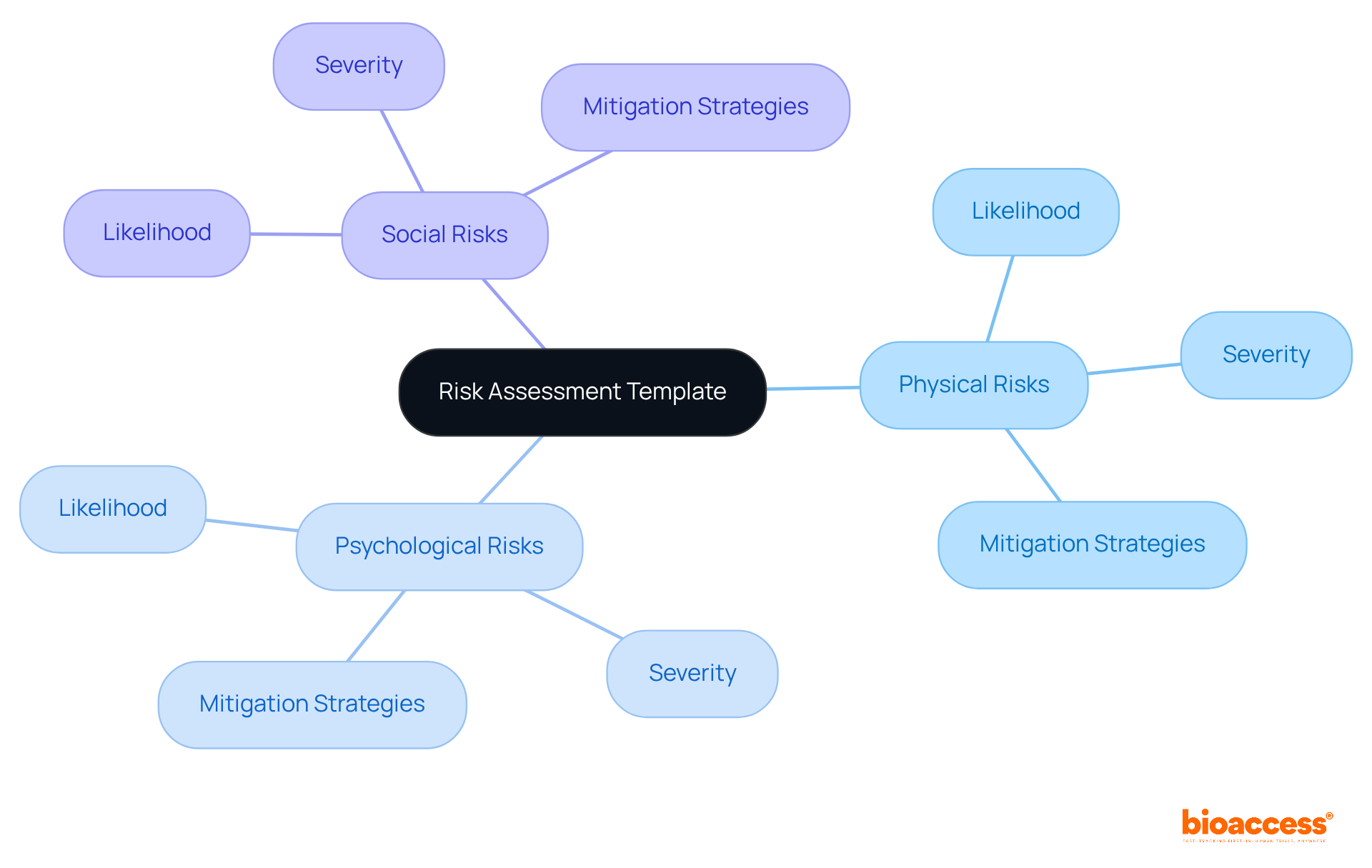
The Data Management Plan Template is essential for clinical research, outlining the procedures for collecting, storing, and sharing participant data. This template not only details data security measures and retention policies but also establishes protocols for sharing information with third parties. By implementing these guidelines, researchers can ensure compliance with data protection regulations while effectively safeguarding participant confidentiality.
In the evolving Medtech landscape, the importance of such a template cannot be overstated. It addresses key challenges faced by researchers, providing a structured approach to data management that enhances both security and trust. As the demand for transparency and accountability in clinical research grows, utilizing this template becomes a critical step for researchers aiming to uphold ethical standards.
In conclusion, collaboration in data management is vital for the success of clinical research. By adopting the Data Management Plan Template, researchers can take proactive steps toward ensuring the integrity and confidentiality of participant data, ultimately leading to more reliable and trustworthy research outcomes.
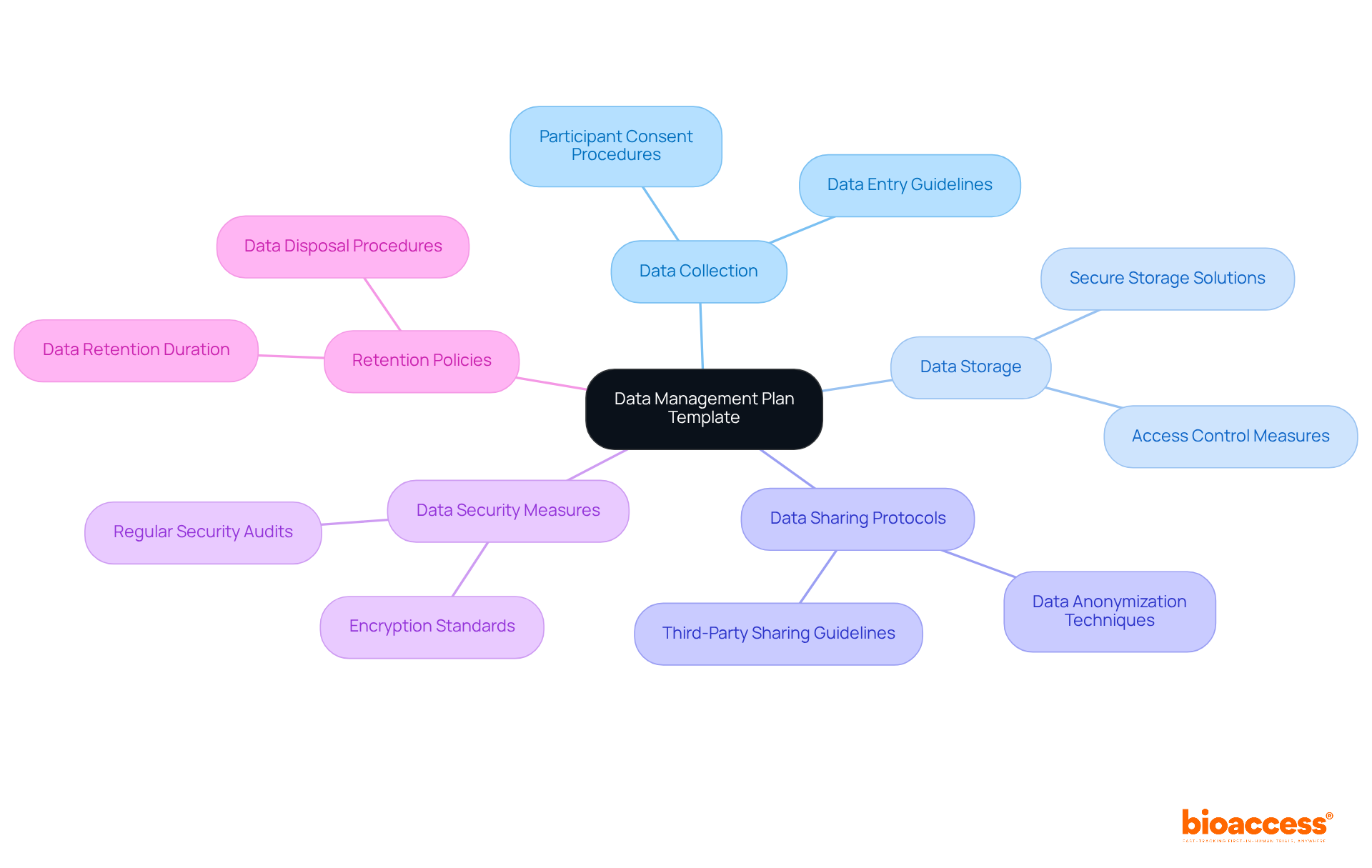
The Conflict of Interest Declaration Template is an essential resource for researchers, providing a structured format to disclose any potential conflicts that may influence study outcomes. This template includes sections for detailing financial interests, personal relationships, and other relevant disclosures. Encouraging transparency through such statements is vital for upholding the integrity of the research process and building trust among stakeholders. Experts in research integrity emphasize that clear and comprehensive disclosures not only safeguard the credibility of scientific results but also enhance public confidence in study outcomes.
Current trends in 2025 highlight a growing focus on standardized disclosure practices, reflecting a broader commitment to transparency in biomedical research. By adopting alims-approved templates for ethics committees, researchers can effectively manage conflicts of interest, ensuring that their work remains unbiased and ethically sound. Successful examples of conflict disclosures demonstrate how adherence to these practices can uphold research integrity and cultivate a culture of accountability within the scientific community.
In light of these developments, it is crucial for researchers to recognize the importance of collaboration and the next steps in implementing these templates. How can you ensure that your research practices align with these emerging standards? By prioritizing transparency and ethical considerations, you can contribute to a more trustworthy and credible scientific landscape.
The Roles and Responsibilities Template clearly outlines the specific functions of each ethics committee member, including the chair, committee members, and administrative support. This clarity in expectations and responsibilities fosters effective collaboration and informed decision-making within the committee. Research indicates that committees with well-defined mandates enhance oversight effectiveness by 40% (Accenture, 2023). Furthermore, efficient teamwork within ethics committees significantly improves the standard of research studies. For example, a recent survey found that organizations with ethics committees experienced a 32% reduction in ethical violations during AI deployment (PwC, 2023), underscoring the impact of structured teamwork.
As one chair of an ethics committee aptly noted, "Collaboration is not just about working together; it's about understanding each other's strengths and leveraging them for better outcomes." This sentiment echoes Henry Ford's assertion: "Coming together is a beginning, staying together is progress, and working together is success," which highlights the essence of teamwork. Current best practices for 2025 emphasize the necessity for ongoing training and engagement with diverse stakeholders to ensure that all perspectives are considered. This approach ultimately leads to more robust ethical oversight.
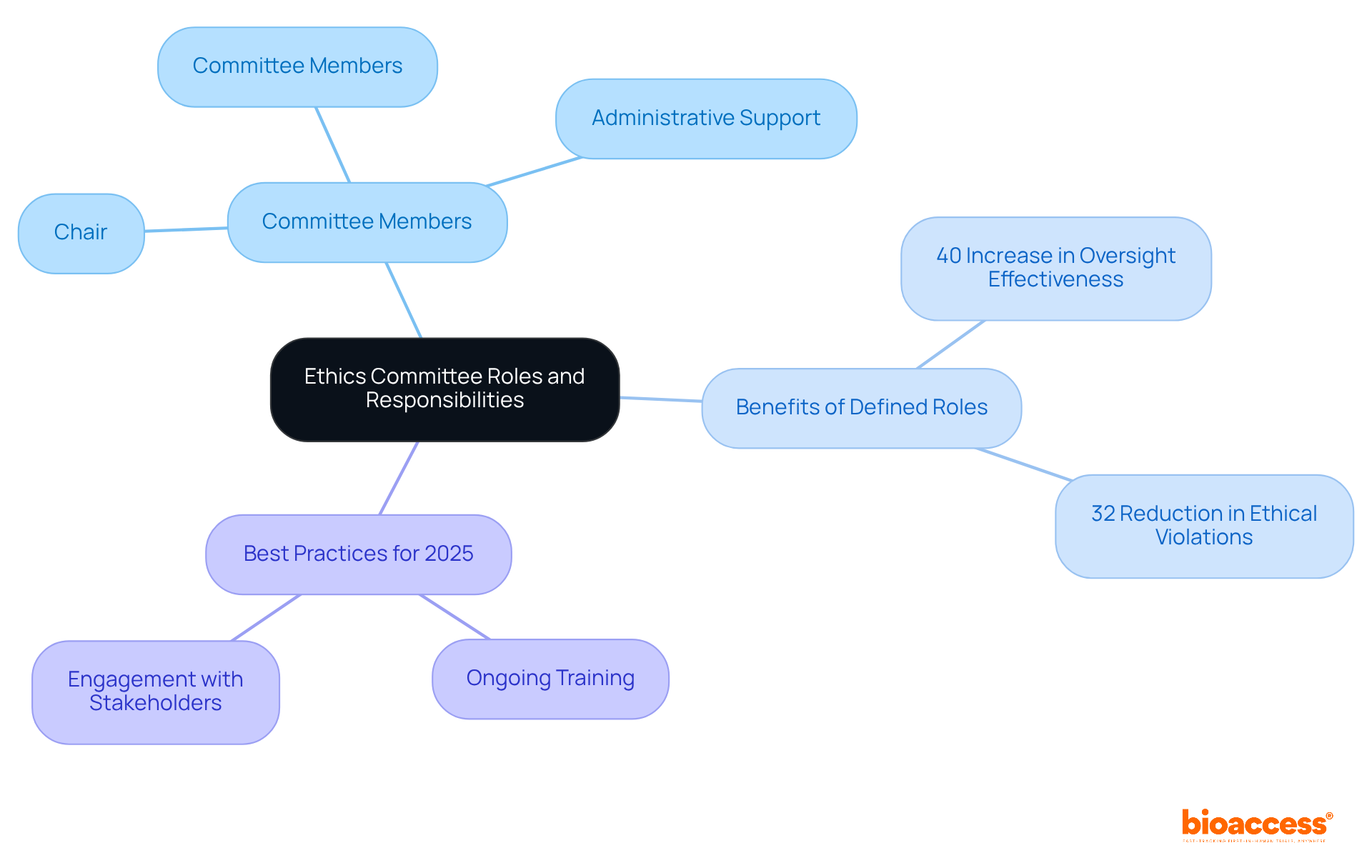
The Adverse Event Reporting Template serves as a crucial tool in clinical research, providing an organized format for documenting and reporting any adverse events that occur during trials. This template includes dedicated sections for detailing the nature of each event, assessing its severity, and outlining the actions taken in response. Such a systematic approach is vital for ensuring participant safety and adhering to regulatory requirements.
In the ever-evolving Medtech landscape, bioaccess plays a pivotal role in addressing key challenges. By employing thorough trial management services - ranging from feasibility analyses and site selection to compliance assessments and project oversight - bioaccess guarantees that every aspect of the trial, including adverse event reporting, is meticulously managed. This commitment ensures that ethical and regulatory standards are not just met but exceeded.
Ultimately, collaboration is essential in navigating the complexities of clinical research. By leveraging the alims-approved templates for ethics committees and the expertise of bioaccess, stakeholders can enhance their trial management processes, ensuring safety and compliance at every step.
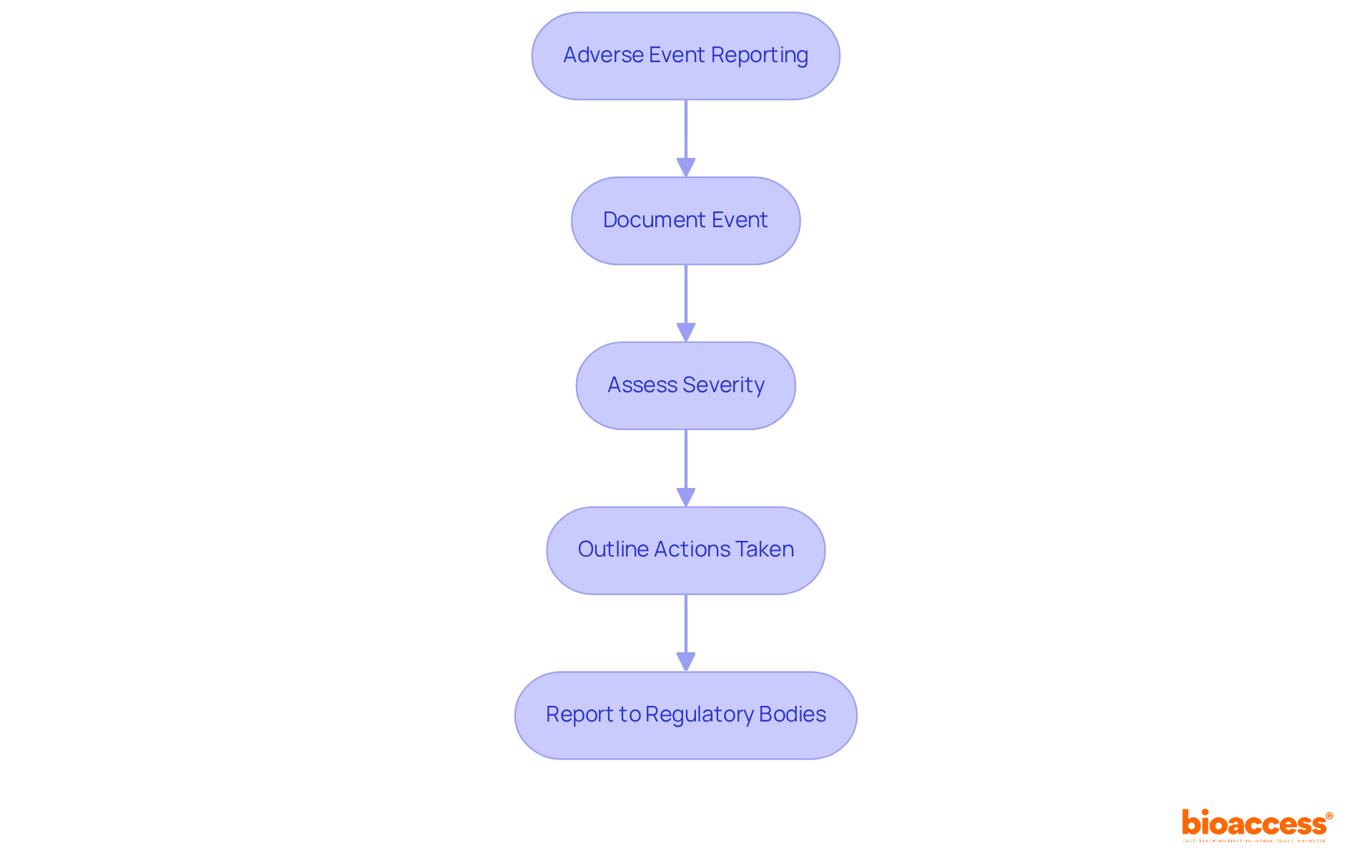
The Communication Log Template is an essential tool for documenting all significant communications related to clinical studies, including interactions with team members, ethics committee discussions, and participant communications. This systematic approach not only enhances transparency but also fosters accountability within the study group. In 2025, effective communication stands as a cornerstone of successful collaboration, with 96% of business decision-makers and 95% of employees recognizing it as a critical skill (Microsoft).
Moreover, research indicates that teams with clear communication strategies are 1.9 times more likely to achieve above-median financial performance (Gartner). Effective communication simplifies processes and cultivates a culture of teamwork, which is vital in research studies. For instance, trial coordinators emphasize that regular updates and transparent feedback channels significantly enhance team dynamics and project outcomes.
By utilizing the Communication Log Template, project teams ensure that all pertinent information is readily accessible, leading to more effective and successful trials. Furthermore, with 39% of employees believing that individuals in their organization do not cooperate sufficiently, there is a pressing need for improved communication methods in medical studies. This highlights the importance of collaboration and the next steps necessary to enhance communication in clinical research.
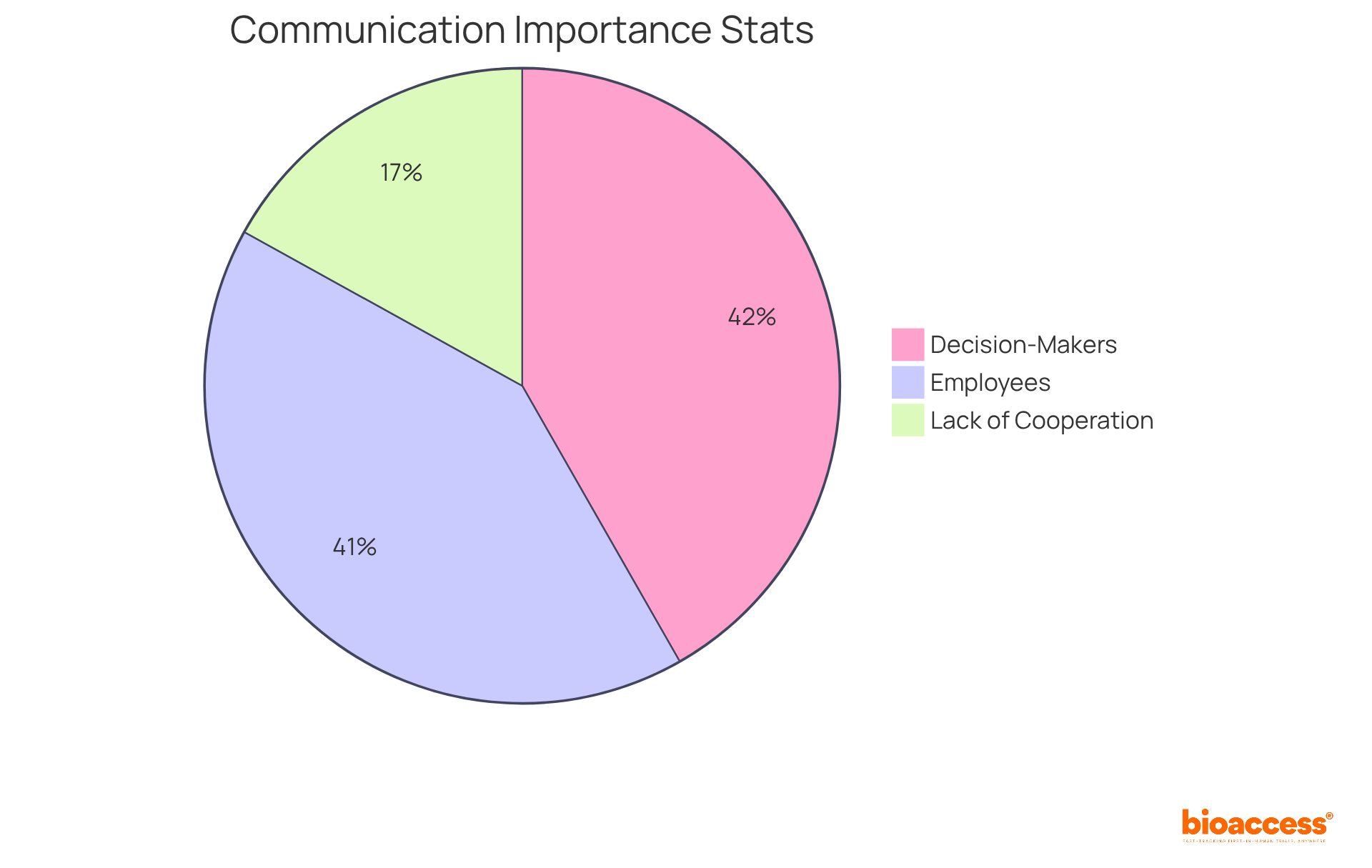
The Final Report Template serves as a vital tool for summarizing the outcomes of the ethics review process in clinical research. It provides a structured format that details the committee's decisions, recommendations, and any conditions for approval. This comprehensive report is not just a formality; it is essential for maintaining transparency and accountability throughout the research process.
Moreover, this template aligns seamlessly with bioaccess's extensive clinical trial management services, which include:
By utilizing this template, researchers can effectively capture all necessary information, facilitating smoother communication with ethics committees. This, in turn, enhances the overall efficiency of the submission process, ensuring that every detail is accounted for.
In the ever-evolving Medtech landscape, the importance of such structured documentation cannot be overstated. It addresses key challenges faced by researchers and reinforces the need for collaboration and clarity in clinical trials. As you consider your own research endeavors, think about how this template can streamline your processes and improve outcomes.
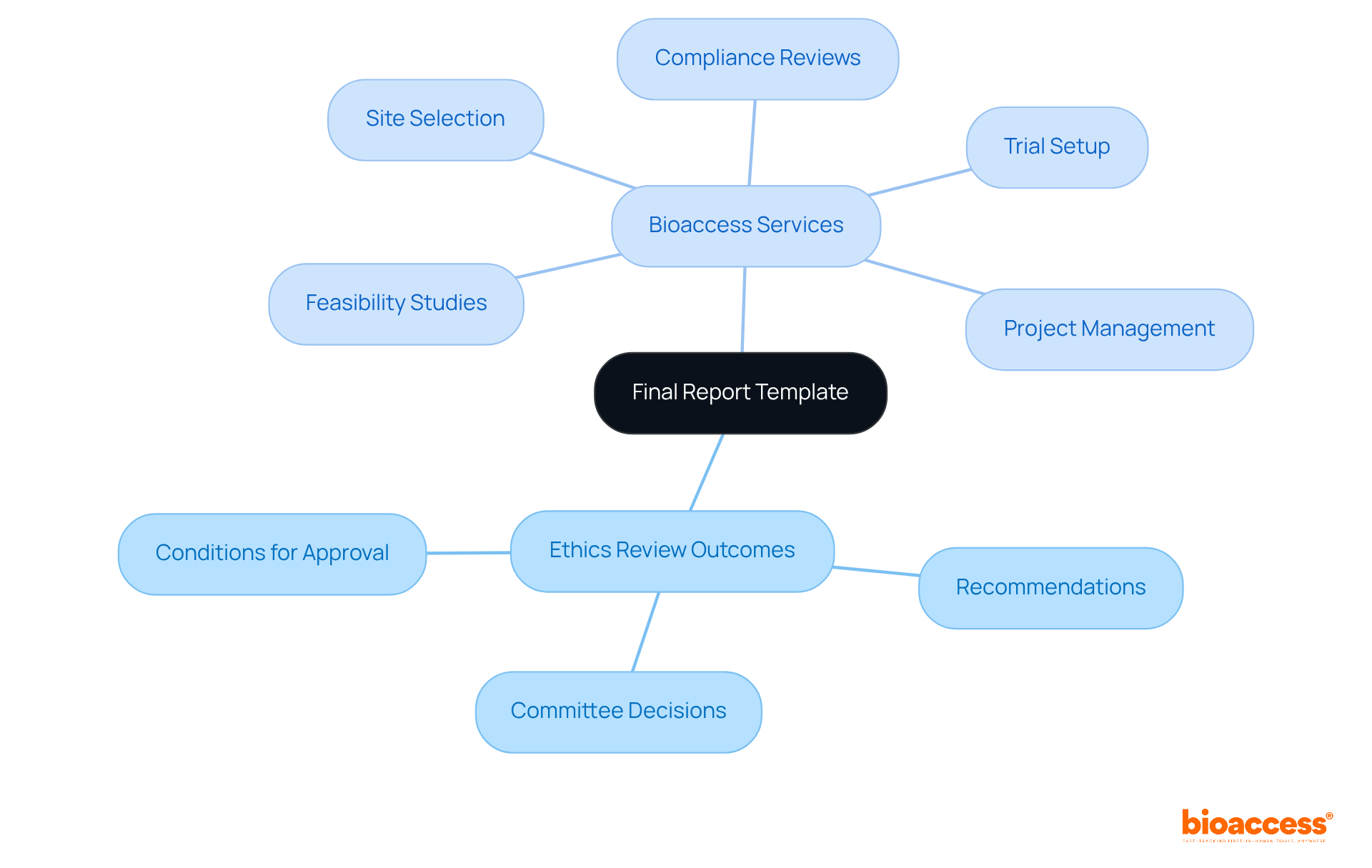
By implementing ALIMS-approved templates, organizations can significantly enhance the efficiency and transparency of their ethics committees. These templates are essential tools for streamlining processes, ensuring compliance, and fostering effective communication among stakeholders. The structured formats simplify submission and review processes while promoting a culture of accountability and ethical integrity within clinical research.
Throughout this article, we explored key templates such as the bioaccess® Ethics Committee Template, Informed Consent Template, and Study Protocol Template. Each template addresses specific challenges faced in clinical trials, from expediting approval processes to ensuring participant safety and understanding. The emphasis on collaboration, defined roles, and systematic documentation underscores the importance of a well-organized approach in navigating the complexities of clinical research.
In light of these insights, it is crucial for researchers and organizations to adopt these best practices and templates. By prioritizing streamlined processes and ethical considerations, the clinical research community can enhance the quality of studies and build trust with participants and stakeholders. Embracing these tools will lead to more reliable outcomes, ultimately advancing the field of medical research and improving participant experiences.
What is the purpose of the bioaccess® Ethics Committee Template?
The bioaccess® Ethics Committee Template is designed to expedite the review and approval of clinical study protocols by providing essential documentation sections, such as study objectives, methodologies, and ethical considerations.
How does the use of the bioaccess® Ethics Committee Template impact the approval duration?
Utilizing this template significantly reduces the average duration for ethics committee approvals, which is approximately 48 days as of 2025, allowing medical study teams to initiate studies more swiftly.
Why are streamlined ethics committee processes important in clinical studies?
Streamlined processes are vital as they reduce the overall time to site activation and enhance communication between researchers and ethics committees, thereby accelerating study timelines.
What expertise does bioaccess® bring to study management?
Bioaccess® leverages over 20 years of experience in managing various research studies, including Early-Feasibility Studies, First-In-Human Studies, Pilot Studies, Pivotal Studies, and Post-Market Follow-Up Studies.
What is the role of the Informed Consent Template in clinical trials?
The Informed Consent Template outlines essential information for participant communication, clearly stating the project's purpose, potential risks, and benefits to facilitate informed decision-making.
What challenges exist regarding participant understanding of informed consent?
Studies indicate that comprehension rates for complex concepts in informed consent are often below 50%, with particularly low understanding for randomization (39.4%) and placebo concepts (4.8%).
How does the Informed Consent Template enhance participant understanding?
The template includes sections that document the consent process, aligning with best practices and regulatory requirements to ensure participants grasp the implications of their involvement.
What current trends are emerging in informed consent processes?
There is a growing use of multimedia tools and cocreation strategies to enhance comprehension, with interactive applications and educational aids proving effective in improving understanding among diverse populations.
What is the importance of the Study Protocol Template in clinical trials?
The Study Protocol Template is crucial for clearly defining research objectives, design, and methodologies, ensuring thorough planning and adherence to ethical standards.
How can a well-defined protocol benefit clinical research?
A structured protocol can significantly reduce the likelihood of protocol deviations, thereby maintaining the integrity of research and ensuring participant safety, ultimately leading to more reliable results.